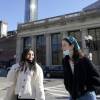A day after White House health officials urged Americans to get an updated COVID-19 booster shot along with their flu shot, some local health practitioners warned that the federal messaging may be too optimistic.
Cassandra Pierre, an infectious disease physician at Boston Medical Center, says she is readying a plan to notify patients about the newly formulated booster. The shot, recommended by the CDC last week, targets newer variants like BA.4 and BA.5. But Pierre also told GBH News that she worries telling the public that the pandemic is ebbing may backfire.
“We have seen that COVID has continued to surprise us, that we have occasionally seen variants crop up in a matter of weeks become the dominant strain,’’ she said. “There is no guarantee that that won’t continue to happen in the future.”
Ashish Jha, the White House COVID-19 response coordinator, detailed in a press conference how the vaccines had “caught up with the virus” and “barring those variant curveballs,” many Americans will only require one COVID-19 shot a year.
“We are moving to a point where a single annual COVID shot should provide a high degree of protection against serious illness all year,’’ he said. “It marks our ability to make COVID vaccines a more routine part of our lives as we continue to drive down serious illness and deaths and protect Americans heading into the fall and winter.”
Lara Jirmanus, a primary care physician in Revere, says she too welcomes the updated booster but worries that promoting it along with the flu shot diminishes the seriousness of the coronavirus.
“We just need to be sending the message to the public that we need to take this pandemic seriously and COVID is not just a cold,” said Jirmanus, who also is co-founder of the nonprofit Massachusetts Coalition for Health Equity. “And that is why people are rolling their eyes at the new shot, because they think that they don't need it.“
Nearly 85 percent of Massachusetts residents ages five and older are fully vaccinated, according to state data. But that figure drops significantly for boosters: among those fully vaccinated, just over half have received their first booster shot. Massachusetts leads the national average on both counts: 72 percent of people five and older are fully vaccinated across the country, and just under half of the fully vaccinated have received their first booster, national figures show.
An additional booster has been taken up by a smaller share. They were first made available to people over 50 in March, and since then, 36 percent of people in that age group — who have their first booster — have gotten a second booster. Nationally, that figure is 34 percent.
Updated Pfizer and Moderna boosters, now recommended by the CDC for anyone over 12, began to arrive directly to health care providers last week and should soon be more widely available, according to the state Department of Public Health. Those interested in making an appointment can go online to vaxfinder.mass.gov .
Bill Hanage, an associate professor of epidemiology at the Harvard, T.H. Chan School of Public Health, says specialists expect the virus to evolve. But currently, he says, getting boosted to protect against the current dominant variant is good for individuals and the community.
“We have these vaccines which are capable of protecting against those viruses which are currently circulating in our community and that you're likely to encounter over the next few months,” he said. “So giving people something to help protect them against that is just good sense.”
Watch: Who should get an omicron booster and when?









